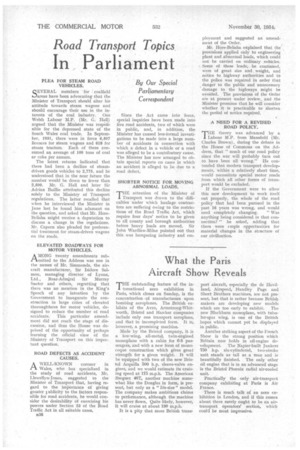Road Transport Topics
Page 54

If you've noticed an error in this article please click here to report it so we can fix it.
In Parliament
By Our Special Parliamentary Correspondent
PLEA FOR STEAM ROAD VEHICLES.
SEVERAL members for coalfield areas have been advocating that the Minister of Transport should alter his attitude towards steam wagons and should encourage their use in the interests of the coal industry. One Welsh Labour M.P. (Mr. G. Hall) argued that the Minister was responsible for the depressed state of the South Wales coal trade. In September, 1931, there were in force 6,507 licences for steam wagons and 618 for steam tractors. Each of these consumed an average of 100 tons of coal or coke per annum.
The latest returns indicated that there had been a decline of steamdriven goods vehicles to 2,775, and he understood that in the near future the number would be down to fewer than 2,500. Mr. G. Hall and later Sir Adrian Baillie attributed this decline solely to the Ministry of Transport regulations. The latter recalled that when he interviewed the Minister in June last be found him adamant on the question, and asked that Mr. HareBelisha might receive a deputation to discuss a change in the regulations. Mr. Caporn also pleaded for preferential treatment for steam-driven wagons on the roads.
ELEVATED ROADWAYS FOR MOTOR VEHICLES.
AMONG twenty amendments subitiated to the Address was one in the names of Mr. Sirnmonds, the aircraft manufacturer, Sir Isidore Salmon, managing director of Lyons, Ltd., Rear-Admiral Sir Murray Sueter and others, regretting that there was no mention in the King's Speech of any intention by the Government to inaugurate the construction in large cities of elevated thoroughfares for motor vehicles, designed to reduce the number of road accidents. This particular amendment did not reach the stage of discussion, and thus the House was deprived of the opportunity of perhaps learning the official view of the Ministry of Transport on this important question.
ROAD DEFECTS AS ACCIDENT CAUSES.
AWELL-KNOWN coroner in Wales, who has specialized in the study of road accidents, Mr. Llewellyn-Jones, suggested to the Minister of Transport that, having regard to the importance of giving greater tublicity to the factors responsible for road accidents, he would consider the desirability of exercising his powers under Section 23 of the Road Traffic Act in all suitable cases.
B36 Since the Act came into force, special inquiries have been made into five road accidents, two of which were in public, and, in addition, the Minister has caused less-formal investigations to be made into a large number of accidents in connection with 'which a defect in a vehicle or a road was alleged to be a contributory cause. The Minister has now arranged to obtain special reports on cases in which an accident is alleged to be due to a road defect.
SHORTER NOTICE FOR MOVING ABNORMAL LOADS.
THE attention of the Minister of Transport was drawn to the difficulties under which haulage contractors are suffering owing to the restrictions of the Road Traffic Act, which require four days' notice to be given to all county and borough authorities before heavy loads are moved. Sir John Wardlaw-Milne pointed out that this was hampering industry and em
ployment and suggested an amendment of the Order.
Mr. Hore-Belisha explained that the' provisions applied only to engineering plant and abnormal loads, which could not be carried on ordinary vehicles. Some of these loads, he continued, were of great size and weight, and notice to highway authorities and to the police was required in order that danger to the public and unnecessary damage to the highways might be avoided. The provisions of the Order are at present under review, and the Minister promises that he will consider whether it is practicable to shorten the period of notice required.
A NEED FOR A REVISED ROAD POLICY.
THE theory was advanced by a Labour M.P. from Mansfield (Mr. Charles Brown), during the debate in the House of Commons on the Address, that " much of our road policy since the war will probably turn out to have been all wrong." He contended that modern transport developinents, within a relatively short time, would necessitate special motor roads from which all other forms of transport would be excluded.
If the Government were to allow this new development to work itself out properly, the whole of the road policy that had been pursued in the past 16 years was wrong, and would need completely changing. "Was anything being considered in that connectiOn? " he asked, adding that there were Emple opportunities for material changes in the structure of • our civilization.




































































































